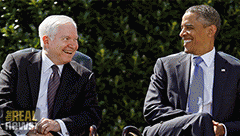| Back OpEd News | |||||||
|
Original Content at https://www.opednews.com/articles/Gates-Memoir-Omits-Key-Fac-by-TheRealNews-Networ-Afghan-War_Afghanistan-Pullout_Obama_Obama_and_Foreign_Affairs-140119-457.html (Note: You can view every article as one long page if you sign up as an Advocate Member, or higher). |
|||||||
January 19, 2014
Gates Memoir Omits Key Facts on Obama's Afghan War Strategy
By TheRealNews Network
The storyline that is referred to in the memoirs of Robert M. Gates about the president saying that -- referring to being gamed, apparently, by Petraeus, what that was really about was Petraeus, supported, again, by Gates and other top officials in the national security team of Obama, trying to get Obama to relent on his insistence that the withdrawal of U.S. troops should start in mid 2011.
::::::::
Gareth Porter: Gates account conceals the dishonest tactics employed to get Obama's agreement to the Afghan War escalation
Authors Website: http://therealnews.com/t/
Authors Bio:
The Real News Network is a television news and documentary network focused on providing independent and uncompromising journalism.
Our staff, in collaboration with courageous journalists around the globe, will investigate, report and debate stories on the critical issues of our times.
We are viewer supported and do not accept advertising, government or corporate funding.
Independent World Television: RealNewsNetwork.com, Real News Network, Real News, Real News For Real People, IWT, and Independent World Television are trademarks and service marks of IWT.TV inc. "The Real News" is the flagship show of IWT and Real News Network.
